
News
One and Ormiston Endeavour Academy will be conducting a research project to investigate the effect of improved metacognition on academic outcomes for students in science subjects. The study will concentrate on equipping students with metacognitive strategies to allow them to self-evaluate the effectiveness of their learning in class and independently. A shift in focus in the classroom from predominantly content delivery to an emphasis on the importance of metacognition and self-regulation is hoped to positively impact on students' resilience and perseverance to engage with the more difficult scientific concepts. It is anticipated that this will help students to develop the analytical and critical thinking necessary to not only achieve high grades at GCSE or A-level but to also become skilled scientists.
The project will be conducted in conjunction with the Education Endowment Foundation, based on recommendations of a recent guidance report (https://educationendowmentfoundation.org.uk/tools/guidance-reports/metacognition-and-self-regulated-learning/), with funding from the Ipswich Opportunity Fund. It will start in September 2018 and regular updates of the findings will be available on this site.
This research project has now been running for over a half term and initial results in terms of attainment of students in class assessments are promising, particularly where both teachers of a group have implemented strategies to improve students’ metacognitive skills via modelling of techniques for cognition and self-evaluation (e.g. utilising ‘exam-wrappers’).
Results of the five tests conducted under exam conditions so far (based on A-level examination questions) show that in all but one assessment, students made greater progress towards their target attainment grades in the intervention groups compared to the control.

Teachers have commented that directing students to learn material in advance of the lesson (via structured ‘flipped’ homework tasks) has freed up more time in class to develop these skills alongside examination technique and that students appear to pick up the material in lessons more quickly as a result. Students have commented that they ‘like working this way because it prepares them for the content better and they do not feel so overwhelmed’ in lessons. Students in the non-intervention class have also started asking for some of the materials used in the intervention class, such as self-tests, as they see these as beneficial to their learning.
More results will need to be collected for the rest of the academic year to allow for more detailed analysis to take place before any final conclusions about the effectiveness of the strategies to be drawn.
Dr. Tanja Hofmann (Research Lead; tanja.hofmann@suffolkone.ac.uk)
At Ormiston Endeavour the research project has so far focussed on Year 10 groups studying Sciences. Intervention and control groups have been established for two double award groups and two triple award Chemistry groups.
In both instances the intervention classes have been set flipped learning tasks to allow lesson time to focus on exam skills and metacognitive strategies to evaluate their independent learning.
Initial mean results showing the effectiveness of the interventions are promising (Fig. 2) – all intervention groups have made better progress towards their target grades compared to control groups in the three assessments conducted so far. When looking at results of individual students in the double award group, students who admitted that they spent insufficient time on their homework preparation tasks and self evaluation, achieved between two and three grades below their targets in the assessment. All other students were either in line with their target grades or one grade above or below.

Ben Aspin (Research Lead; b.aspin@oeacademy.co.uk)
Between October half term and December, Year 12 Biology students have conducted a further two class assessments and a mock paper of all the content covered so far (also including skills assessments).
Analysis of the outcomes has been shifted to concentrate on differences between the double and single intervention groups compared to double control group only (as these are the only ones consistently taught by only two members of the teaching team).

In all assessments the double and single intervention groups made greater progress towards their ALPS target grade compared to the control groups (Fig 2). This was statistically significant.
Both double and single intervention groups performed on average half a grade closer to their ALPS target across all assessments.
Reflections
Teacher reflections indicate that intervention groups have now developed better independent learning and ‘thinking’ skills compared to the control group, so perform better and persevere more with difficult tasks in lessons. Student reflections on exam wrappers in the intervention group show a link between those students who indicate that they spend a long time on independent learning and evaluation of their learning at home and their attainment in assessments.
Dr. Tanja Hofmann (Research Lead; tanja.hofmann@suffolkone.ac.uk)
